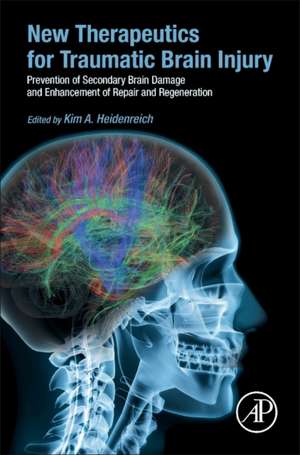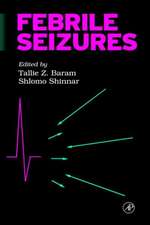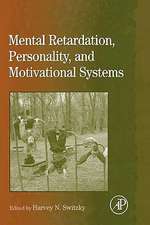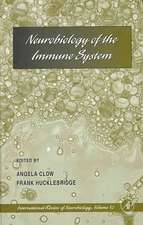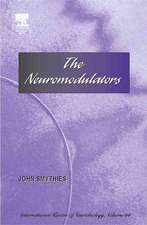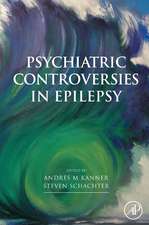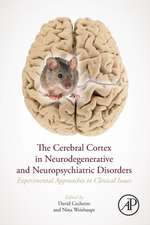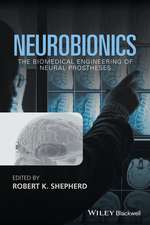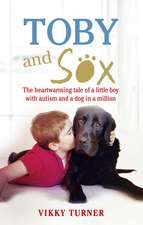New Therapeutics for Traumatic Brain Injury: Prevention of Secondary Brain Damage and Enhancement of Repair and Regeneration
Editat de Kim Heidenreichen Limba Engleză Hardback – 12 oct 2016
This book describes emerging experimental strategies for the treatment of TBI, including new anti-inflammatory or anti-apoptotic therapeutics that limit brain damage, and novel or repurposed drugs that enhance repair or regeneration of the brain after injury.
- Comprehensive overview of basic approaches and translational development of new therapies for TBI
- Edited by a prominent TBI researcher that includes contributions by leading global researchers in the field
- Presents a great resource for researchers and practitioners to learn more about the many evolving preclinical studies and clinical trials currently underway, and the challenges of bringing translational studies in TBI to the clinic
Preț: 691.87 lei
Preț vechi: 797.51 lei
-13% Nou
Puncte Express: 1038
Preț estimativ în valută:
132.43€ • 143.90$ • 111.31£
132.43€ • 143.90$ • 111.31£
Carte tipărită la comandă
Livrare economică 14-28 aprilie
Preluare comenzi: 021 569.72.76
Specificații
ISBN-13: 9780128026861
ISBN-10: 0128026863
Pagini: 352
Dimensiuni: 152 x 229 x 30 mm
Greutate: 0.7 kg
Editura: ELSEVIER SCIENCE
ISBN-10: 0128026863
Pagini: 352
Dimensiuni: 152 x 229 x 30 mm
Greutate: 0.7 kg
Editura: ELSEVIER SCIENCE
Cuprins
Part I. Interventional Therapies for TBI Previously or Currently in Phase 3 Clinical Trials
1. Why Did the Phase III Clinical Trials for Progesterone in TBI Fail? An Analysis of Three Potentially Critical Factors
2. Hypothermia for Traumatic Brain Injury: Current Evidence and Future Directions
3. The Future of TBI: Hyperbaric Oxygen as a Primary Therapeutic Approach
Part II. Repurposing FDA Approved Drugs for TBI Treatment
4. Erythropoietin and Its Derivatives: Mechanisms of Neuroprotection and Challenges in Clinical Translation
5. Atorvastatin in the Treatment of Traumatic Brain Injury
6. The Application of Glibenclamide in Traumatic Brain Injury
7. Perispinal Etanercept for Traumatic Brain Injury
Part III. Interventional Drugs for TBI in Phase 1–2 Clinical Trials
8. Nitric Oxide Synthase Inhibitors in Traumatic Brain Injury
9. Management of Paroxysmal Sympathetic Hyperactivity After Traumatic Brain Injury
Part IV. Interventional Drugs for TBI in Preclinical Development
10. The Use of Estrogen for the Treatment of Traumatic Brain Injury
11. Voltage-Gated Calcium Channel Blockers for the Treatment of Traumatic Brain Injury
12. 5-Lipoxygenase-Activating Protein Inhibitors: Promising Drugs for Treating Acute and Chronic Neuroinflammation Following Brain Injury
13. Carbonyl Scavenging as an Antioxidant Neuroprotective Strategy for Acute Traumatic Brain Injury
14. TrkB Receptor Agonist 7,8-Dihydroxyflavone and Its Therapeutic Potential for Traumatic Brain Injury
15. Ceftriaxone Treatment of TBI
Part V. Drugs for TBI Rehabilitation
16. Memantine: A Safe and Tolerable NMDA Antagonist with Potential Benefits in Traumatic Brain Injury
17. Interventional Drugs for TBI Rehabilitation of Cognitive Impairment: The Cholinesterase Inhibitor Rivastigmine
18. Docosahexaenoic Acid and Omega 3 Fatty Acids
19. Treatment of Mood Disorders Following Traumatic Brain Injury
1. Why Did the Phase III Clinical Trials for Progesterone in TBI Fail? An Analysis of Three Potentially Critical Factors
2. Hypothermia for Traumatic Brain Injury: Current Evidence and Future Directions
3. The Future of TBI: Hyperbaric Oxygen as a Primary Therapeutic Approach
Part II. Repurposing FDA Approved Drugs for TBI Treatment
4. Erythropoietin and Its Derivatives: Mechanisms of Neuroprotection and Challenges in Clinical Translation
5. Atorvastatin in the Treatment of Traumatic Brain Injury
6. The Application of Glibenclamide in Traumatic Brain Injury
7. Perispinal Etanercept for Traumatic Brain Injury
Part III. Interventional Drugs for TBI in Phase 1–2 Clinical Trials
8. Nitric Oxide Synthase Inhibitors in Traumatic Brain Injury
9. Management of Paroxysmal Sympathetic Hyperactivity After Traumatic Brain Injury
Part IV. Interventional Drugs for TBI in Preclinical Development
10. The Use of Estrogen for the Treatment of Traumatic Brain Injury
11. Voltage-Gated Calcium Channel Blockers for the Treatment of Traumatic Brain Injury
12. 5-Lipoxygenase-Activating Protein Inhibitors: Promising Drugs for Treating Acute and Chronic Neuroinflammation Following Brain Injury
13. Carbonyl Scavenging as an Antioxidant Neuroprotective Strategy for Acute Traumatic Brain Injury
14. TrkB Receptor Agonist 7,8-Dihydroxyflavone and Its Therapeutic Potential for Traumatic Brain Injury
15. Ceftriaxone Treatment of TBI
Part V. Drugs for TBI Rehabilitation
16. Memantine: A Safe and Tolerable NMDA Antagonist with Potential Benefits in Traumatic Brain Injury
17. Interventional Drugs for TBI Rehabilitation of Cognitive Impairment: The Cholinesterase Inhibitor Rivastigmine
18. Docosahexaenoic Acid and Omega 3 Fatty Acids
19. Treatment of Mood Disorders Following Traumatic Brain Injury
